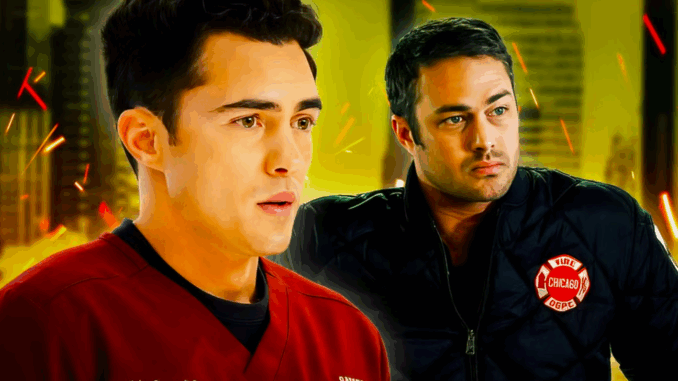
A Cross-Franchise Reset
NBC’s One Chicago franchise — made up of Chicago Fire, Chicago Med, and Chicago P.D. — enters the 2025–2026 television season with more ambition than ever, but also with some of its boldest structural changes to date. After dominating Wednesday night ratings for nearly a decade, the interconnected dramas are facing cast shakeups, creative reboots, and tighter budgets.
Each show returns this October:
-
Chicago Med Season 11 – 8 PM ET/PT
-
Chicago Fire Season 14 – 9 PM ET/PT
-
Chicago P.D. Season 13 – 10 PM ET/PT
All episodes will be available for streaming the following day on Peacock.
Chicago Fire Leads the Shift

Among the three, Chicago Fire is experiencing the most visible transformation. Three cast members — Daniel Kyri (Ritter), Jake Lockett (Carver), and Michael Bradway (Jack Damon) — have exited ahead of the new season. These departures are said to stem from both budget constraints and narrative streamlining.
Despite the losses, Fire retains its core veterans, including Taylor Kinney (Severide), Miranda Rae Mayo (Stella Kidd), and David Eigenberg (Herrmann). A new addition, Brandon Larracuente, will step into a fresh role, likely bringing in new energy and a link to younger viewers.
Showrunner Andrea Newman confirmed that Fire Season 14 will begin with a time jump and follow the firehouse as it recovers from a city audit and prepares for a changing command structure, including Kidd’s pregnancy and Herrmann stepping down.
Med’s Fresh Blood and Emotional Stakes
Chicago Med is also recalibrating. With the exit of Nick Gehlfuss (Dr. Will Halstead) in Season 8 and several newer characters being promoted to leads, the hospital drama will focus on emerging medical ethics dilemmas, cutting-edge treatments, and the burnout crisis plaguing modern healthcare.
Season 11 promises deeper storylines for S. Epatha Merkerson’s Sharon Goodwin and Oliver Platt’s Dr. Charles, with added tension around hospital funding and privatization. A new cardiologist character is also rumored to challenge Dr. Marcel’s leadership.
Med remains the most emotionally grounded of the three shows, often using its episodic cases to explore broader social themes like undocumented patients, trans care, and elder neglect — themes that continue to resonate with viewers.
P.D.’s Lone Wolf Returns
On Chicago P.D., the focus remains squarely on Jason Beghe’s Hank Voight, whose moral ambiguity continues to define the tone of the series. The upcoming Season 13 will reportedly return to a serialized format — more character-driven arcs, less case-of-the-week — and explore the emotional fallout of last season’s undercover disaster involving Atwater.
Tracy Spiridakos (Hailey Upton) has exited the series, and her absence will open up space for a new female detective. The show is expected to push Torres (Benjamin Levy Aguilar) into a more central role, positioning him as Voight’s spiritual successor or ultimate rival.
Voight himself is grappling with being increasingly out of step with modern policing. P.D. will lean into that discomfort, examining how an old-school cop survives in a city demanding reform.
One Chicago’s Shared DNA
What unites Fire, Med, and P.D. isn’t just their overlapping characters — it’s a shared commitment to balancing realism with emotional storytelling. All three series are moving toward leaner casts and more serialized plots, responding to industry shifts like streaming competition, cost-cutting mandates, and evolving viewer expectations.
Gone are the days when crossovers were just fun gimmicks. In 2025–2026, crossovers will now serve deeper narrative purposes. For example, Kidd’s pregnancy complications on Fire may bring her into Med for multiple episodes. Similarly, a fire-related death in Fire could launch a full investigation arc in P.D.
Andrea Newman and Gwen Sigan (showrunner for P.D.) have hinted at “a more emotionally linked universe.” We may see characters grieve, heal, or grow across series lines in ways we haven’t since the early seasons.
Will the Franchise Survive Its Own Evolution?
One Chicago is no longer just a ratings juggernaut — it’s a litmus test for network dramas in a streaming-first world. With its cast slimming, budgets tightening, and stories growing more serialized, 2025 may prove whether this formula can evolve — or whether it will burn out.
What’s clear is that Chicago Fire, Med, and P.D. are no longer resting on their procedural laurels. They are rebuilding, refocusing, and—most importantly—reigniting the very reasons fans fell in love with them.